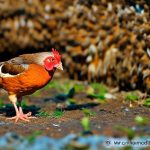Chicken keeping is a popular activity that provides various benefits, including fresh eggs, meat production, and companionship. However, dog owners who also keep chickens often encounter challenges related to their dogs’ predatory instincts. Dogs, being descendants of wolves, possess natural hunting behaviors that can pose a threat to chickens.
This instinctive drive to chase and potentially attack chickens can result in serious consequences, including stress, injury, or fatality for the birds. The safety and welfare of both chickens and dogs depend on understanding the root causes of this behavior and implementing effective prevention strategies. Addressing this issue is essential for maintaining a harmonious environment where both species can coexist safely.
Table of Contents
- 1 Understanding the behavior of dogs towards chickens
- 2 Tips for preventing a dog from harming chickens
- 3 Training techniques to discourage a dog from chasing chickens
- 4 Creating a safe and secure environment for chickens
- 5 Seeking professional help for a dog’s behavior towards chickens
- 6 Conclusion and final thoughts
- 7 FAQs
- 7.1 What are some reasons why a dog keeps getting chickens?
- 7.2 How can I prevent my dog from getting chickens?
- 7.3 What are some training techniques to prevent a dog from getting chickens?
- 7.4 What should I do if my dog keeps getting chickens?
- 7.5 Are there any legal implications if my dog keeps getting chickens?
Key Takeaways
- Dogs have a natural instinct to chase and potentially harm chickens, posing a threat to backyard flocks.
- Understanding a dog’s behavior towards chickens, such as predatory drift and prey drive, is crucial in preventing attacks.
- Tips for preventing a dog from harming chickens include proper socialization, supervision, and providing separate living spaces.
- Training techniques to discourage a dog from chasing chickens involve positive reinforcement, redirection, and desensitization.
- Creating a safe and secure environment for chickens, such as using sturdy fencing and predator-proof coops, is essential for their protection.
- Seeking professional help, such as consulting a dog trainer or behaviorist, can be beneficial in addressing a dog’s behavior towards chickens.
- It is important to prioritize the safety and well-being of both dogs and chickens, and with proper understanding and management, peaceful coexistence is possible.
Understanding the behavior of dogs towards chickens
Instinctual Behavior
Dogs have a natural inclination to chase and hunt small animals, including chickens, due to their instinctual prey drive. This behavior is deeply ingrained in their genetic makeup and can be challenging to overcome. If not properly socialized with chickens from a young age, dogs may view them as prey, triggering their hunting instincts.
Breed-Specific Traits
Some dog breeds have a stronger prey drive than others, making them more likely to exhibit chasing behavior towards chickens. It’s essential to recognize that a dog’s behavior towards chickens is not necessarily a sign of aggression or malice, but rather a result of their natural instincts.
Addressing the Behavior
Understanding the underlying motivation for your dog’s behavior around chickens is crucial in addressing the problem. While some dogs may chase chickens due to their prey drive, others may do so out of curiosity or boredom. By observing your dog’s behavior and identifying the root cause, you can implement effective solutions, such as training and environmental enrichment, to manage and prevent unwanted behavior.
Tips for preventing a dog from harming chickens

Preventing a dog from harming chickens requires a proactive approach that addresses both the dog’s behavior and the environment in which they interact with the chickens. One of the most important steps is to properly socialize your dog with chickens from a young age. This can help them learn to coexist peacefully with the birds and reduce their instinct to chase or harm them.
Additionally, providing plenty of mental and physical stimulation for your dog through regular exercise and interactive play can help reduce their desire to chase chickens out of boredom. Another important tip is to establish clear boundaries and rules for your dog around the chicken coop or yard. This can be done through consistent training and positive reinforcement to teach your dog that chasing or harassing the chickens is not acceptable behavior.
Using verbal commands, such as “leave it” or “stay,” can help redirect your dog’s attention away from the chickens and towards more appropriate activities. It’s also crucial to supervise your dog around the chickens at all times, especially during the initial stages of training, to prevent any unwanted behavior.
Training techniques to discourage a dog from chasing chickens
Training is an essential tool for discouraging a dog from chasing chickens and teaching them appropriate behavior around the birds. Positive reinforcement techniques, such as using treats or praise, can be highly effective in shaping your dog’s behavior. When your dog shows calm and non-threatening behavior around the chickens, be sure to reward them with treats and verbal praise to reinforce this positive behavior.
Consistency is key when it comes to training, so be sure to practice these techniques regularly to help your dog understand what is expected of them. Another effective training technique is desensitization, which involves gradually exposing your dog to the presence of chickens in a controlled and positive manner. This can help reduce their arousal and prey drive towards the birds over time.
Start by keeping your dog on a leash and at a safe distance from the chickens, then gradually decrease the distance as they become more comfortable and relaxed in their presence. This process should be done slowly and patiently to avoid overwhelming your dog and triggering their chasing instinct. Additionally, using deterrents such as noise-making devices or motion-activated sprinklers near the chicken coop can help discourage your dog from approaching or chasing the birds.
These tools can help create a negative association with the chickens, making them less appealing targets for your dog’s prey drive.
Creating a safe and secure environment for chickens
Creating a safe and secure environment for your chickens is essential for their well-being and protection from potential harm by dogs or other predators. Start by ensuring that the chicken coop and run are securely fenced and predator-proof to prevent any unauthorized access by dogs or other animals. This may involve using hardware cloth or welded wire mesh to reinforce the coop’s structure and burying it underground to prevent digging.
Additionally, providing adequate shelter and hiding spots within the chicken run can help the birds feel safe and secure in their environment. This can include adding shrubs, bushes, or other vegetation for them to hide in, as well as elevated perches or roosts where they can escape from potential threats. It’s also important to consider the layout of your property and how it may impact the interaction between your dog and chickens.
For example, keeping the chicken coop in a separate fenced area away from where your dog spends most of their time can help minimize opportunities for unwanted interactions. By creating physical barriers and boundaries between your dog and the chickens, you can reduce the likelihood of chasing or harm occurring.
Seeking professional help for a dog’s behavior towards chickens

Expert Guidance and Customized Solutions
These professionals have the knowledge and experience to assess your dog’s behavior and develop a customized training plan tailored to their specific needs. They can provide expert advice on training techniques, behavior modification strategies, and management practices to prevent your dog from harming chickens.
Creating a Safe Environment
A professional trainer can also offer support and guidance on how to create a safe environment for both your dog and chickens. They can help you identify and address any underlying issues that may be contributing to your dog’s behavior, and provide advice on how to manage situations that may trigger their prey drive.
Addressing Underlying Issues
In some cases, it may be necessary to consult with a veterinarian to rule out any underlying medical or behavioral issues that could be contributing to your dog’s behavior. Additionally, medication or other interventions may be recommended to help manage your dog’s prey drive and reduce their inclination to chase or harm chickens.
Conclusion and final thoughts
In conclusion, understanding and addressing a dog’s behavior towards chickens is essential for creating a harmonious and safe environment for both pets and livestock. By recognizing the natural instincts that drive this behavior and implementing proactive measures such as socialization, training, and environmental management, you can help prevent your dog from harming chickens. Creating a secure environment for the birds and seeking professional help when needed are also important steps in addressing this issue effectively.
Ultimately, with patience, consistency, and dedication, it is possible to modify your dog’s behavior and foster a peaceful coexistence between them and your feathered friends. By taking proactive steps to address this issue, you can ensure the safety and well-being of both your dogs and chickens while enjoying the many benefits of keeping both as part of your household.
If you’re struggling with a dog that keeps getting chickens, you may want to consider building a secure chicken coop to protect your flock. Poultry Wizard offers a helpful article on 10 essential tips for building a chicken coop that can help you keep your chickens safe from predators like your dog. Additionally, if you have an old shed that you can convert into a chicken coop, Poultry Wizard also has a guide on how to convert a shed into a chicken coop. And if you’re considering adding turkeys to your flock, you may be wondering if they need a coop. Poultry Wizard has an article on whether turkeys need a coop that can provide valuable information for keeping your poultry safe and secure.
FAQs
What are some reasons why a dog keeps getting chickens?
Some reasons why a dog may keep getting chickens include natural predatory instincts, lack of proper training or supervision, boredom, or a lack of appropriate outlets for energy and stimulation.
How can I prevent my dog from getting chickens?
To prevent a dog from getting chickens, it is important to provide proper training, supervision, and containment. This may include using a secure fence or kennel, providing enough mental and physical stimulation, and teaching the dog appropriate behaviors around chickens.
What are some training techniques to prevent a dog from getting chickens?
Training techniques to prevent a dog from getting chickens may include positive reinforcement, desensitization, and redirection. It is important to work with a professional dog trainer or behaviorist to develop a training plan tailored to the specific needs of the dog and the situation.
What should I do if my dog keeps getting chickens?
If a dog keeps getting chickens, it is important to address the behavior promptly to prevent harm to the chickens and potential legal issues. This may involve seeking professional help from a dog trainer or behaviorist, implementing proper containment measures, and addressing any underlying reasons for the behavior.
Are there any legal implications if my dog keeps getting chickens?
There may be legal implications if a dog keeps getting chickens, especially if the chickens belong to someone else. In some areas, dog owners may be held responsible for damages caused by their pets, including harm to livestock. It is important to be aware of local laws and regulations regarding pet ownership and animal control.
Meet Walter, the feathered-friend fanatic of Florida! Nestled in the sunshine state, Walter struts through life with his feathered companions, clucking his way to happiness. With a coop that’s fancier than a five-star hotel, he’s the Don Juan of the chicken world. When he’s not teaching his hens to do the cha-cha, you’ll find him in a heated debate with his prized rooster, Sir Clucks-a-Lot. Walter’s poultry passion is no yolk; he’s the sunny-side-up guy you never knew you needed in your flock of friends!







